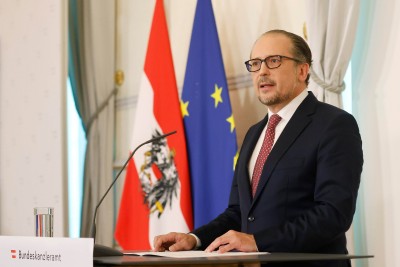Austrian Foreign Minister Schallenberg Visits Bulgaria and North Macedonia
Austria's Foreign Minister Alexander Schallenberg travels to Bulgaria and Northern Macedonia to promote EU enlargement in the Western Balkans. Especially against the backdrop of the Russian war of aggression in Ukraine, stable and European-oriented Balkans are important.
 Austrian Foreign Minister Schallenberg supports the Euro integration of the Balkan countries. / Picture: © Bundeskanzleramt (BKA) / Dragan Tatic
Austrian Foreign Minister Schallenberg supports the Euro integration of the Balkan countries. / Picture: © Bundeskanzleramt (BKA) / Dragan Tatic
Foreign Minister Alexander Schallenberg is pushing ahead with his agenda with the planned enlargement of the European Union to include the Western Balkan states.
Especially in view of the Ukraine war and Ukraine's increased EU ambitions, it is important to remember the states of former Yugoslavia, which are waiting for nearly 25 years for their EU integration.
The EU member Bulgaria is blocking the start of accession negotiations with North Macedonia, therefor Foreign Minister Schallenberg traveled on Europe Day to Bulgaria and met with representatives of the Bulgarian government in Sofia.
In addition to discussions with Foreign Minister Teodora Genchovska and Deputy Prime Minister and Finance Minister Assen Vassilev, the agenda also included a working meeting with President Rumen Radev.
In addition to the Russian war of aggression in Ukraine, the talks focused primarily on the EU enlargement process in the Western Balkans.
The importance of stability for Europe is also demonstrated by the severe impact of Russia's war of aggression far beyond Ukraine's borders. Not only are supply chains disrupted, for example, but Europe's entire energy security is at risk. As recently as April, Russia halted gas supplies to Bulgaria and Poland.
"The Russian attempt to weaken energy security in Europe by stopping gas supplies to Bulgaria and Poland is absolutely unacceptable. In the medium term, as this Russian step shows us, there is no way around transforming our supply chains in the energy sector and massively increasing investments in renewable energies", said Foreign Minister Schallenberg.
"We must not lose the Western Balkans. We have to step on the gas now. Bulgaria will benefit massively when it is surrounded almost exclusively by EU states", emphasized Foreign Minister Schallenberg.
Just as Austria had already fully supported Bulgaria's EU accession in the mid-2000s, Austria has also always been a strong supporter of the EU enlargement of the Western Balkan states.
In particular, the early start of accession negotiations with Albania and Northern Macedonia must be a priority, was stressed by Schallenberg.
In Sofia, Schallenberg did show understanding of the "sensitive points" between neighbors Bulgaria and northern Macedonia. But he appealed for Bulgaria to lift its veto and for the problems to be clarified during the accession negotiations.
Bulgaria is blocking the accession negotiations for various reasons regarding cultural politics, such as the Macedonian language policy. Bulgaria claims the Macedonian language and culture for itself.
The visit to Bulgaria not only demonstrated the close friendship between Bulgaria and Austria, among others seat neighbors in the European Council, but also the economic ties between the two countries. Around 350 Austrian companies now secure 20,000 jobs in Bulgaria.
Following his visit to Bulgaria, Foreign Minister Alexander Schallenberg traveled to Skopje on May 10, 2022, where he met his Macedonian counterpart Foreign Minister Bujar Osmani as well as President Stevo Pendarovski and Prime Minister Dimitar for working talks.
In addition to the Russian war of aggression on Ukraine, the economic relations between North Macedonia and Austria, the main focus was on the EU enlargement in the Western Balkans.
Austria has always supported the accession of Northern Macedonia to the EU, but this has been delayed for decades by blockades by neighboring states.
It was not until 2018 that a dispute with Greece over the state name Macedonia was settled, the arbitration of which in 2020 led to the approval of the Union's heads of state and government for the start of EU accession talks with northern Macedonia. Since then, EU member Bulgaria, among others, has opposed the start of accession negotiations with northern Macedonia.
"Never before in history has it been so important to strengthen the credibility of the EU accession perspective for the countries of the Western Balkans. A special priority is to finally start the long overdue accession negotiations with Northern Macedonia and Albania, without further delay!" said Foreign Minister Schallenberg with determination.
BMEIA Federal Ministry for Europe Integration and Foreign Affairs



